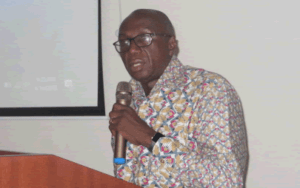Government committed to mass atrocity prevention in Ghana – Interior Ministry

Government says it is committed to promoting the effective management of national mechanisms for the prevention of mass atrocity in Ghana.
In a speech read on his behalf, Mr Ambrose Dery, Minister for the Interior, said inter-governmental arrangements, regional mechanisms, national structures and other state and non-state actions, were some of the efforts being made to ensure the protection of populations from genocide, war crimes, ethnic cleansing, and crimes against humanity.
Mr Dery made the comments on Tuesday at the opening of a three-day Training Workshop on Establishing and Managing National Mechanisms for Mass Atrocity Prevention, in Accra.
The training is being organised by the National Peace Council of Ghana (NPC) in partnership with Kofi Annan International Peacekeeping Training Centre (KAIPTC) and supported by the Global Action Against Mass Atrocity Crimes (GAAMAC).
In all, 25 Government and civil society agents would be trained in mass atrocity prevention.
Mr Dery said despite the multiplicity of actors and processes that contributed to the prevention of atrocity crimes, various States still had the primary responsibility to protect their populations under the principles of the Responsibility to Protect (R2P).
“This makes room for the international community to assist States where they lack the capacity, or to respond decisively where States fail to deliver on their responsibility,” he added.
He said statutory bodies, legislative processes and independent human rights institutions, had all played positive roles in the prevention of atrocity crimes in Africa.
Mr Dery said based on the successes of the structures in parts of West and East Africa, national mechanisms had become a blueprint for atrocity prevention and local peacebuilding on the continent.
However, he said the national mechanisms were sometimes faced with several challenges that limited their effectiveness.
The challenges include inadequate capacity to design early warning programmes and evaluate the impact of atrocity prevention programmes, exclusion of key stakeholders such as women, youth, and indigenous groups, difficulties garnering political will from state institutions and mobilizing resources to support these mechanisms.
Mr George Amoh, Executive Secretary, NPC said they were not oblivious of the current attacks in the sub-region in recent times.
He said these happenings were a wakeup call to other States, including Ghana to ensure that they built the necessary resilience against atrocity.
Mr Ernest Lartey, Head of Peace and Security Studies, KAIPTC, said “atrocity crimes” had attracted much attention from the international community, thereby their willingness to always intervene in such matters.
He lauded NPC for being at the forefront of local conflict resolution in Ghana, which had attracted many member counties within the West African Region to understudy it.
Mr Lartey noted that the workshop would create a greater awareness on mass atrocity crimes to citizens, Civil Society Organisations and Government agencies.
Source: GNA
